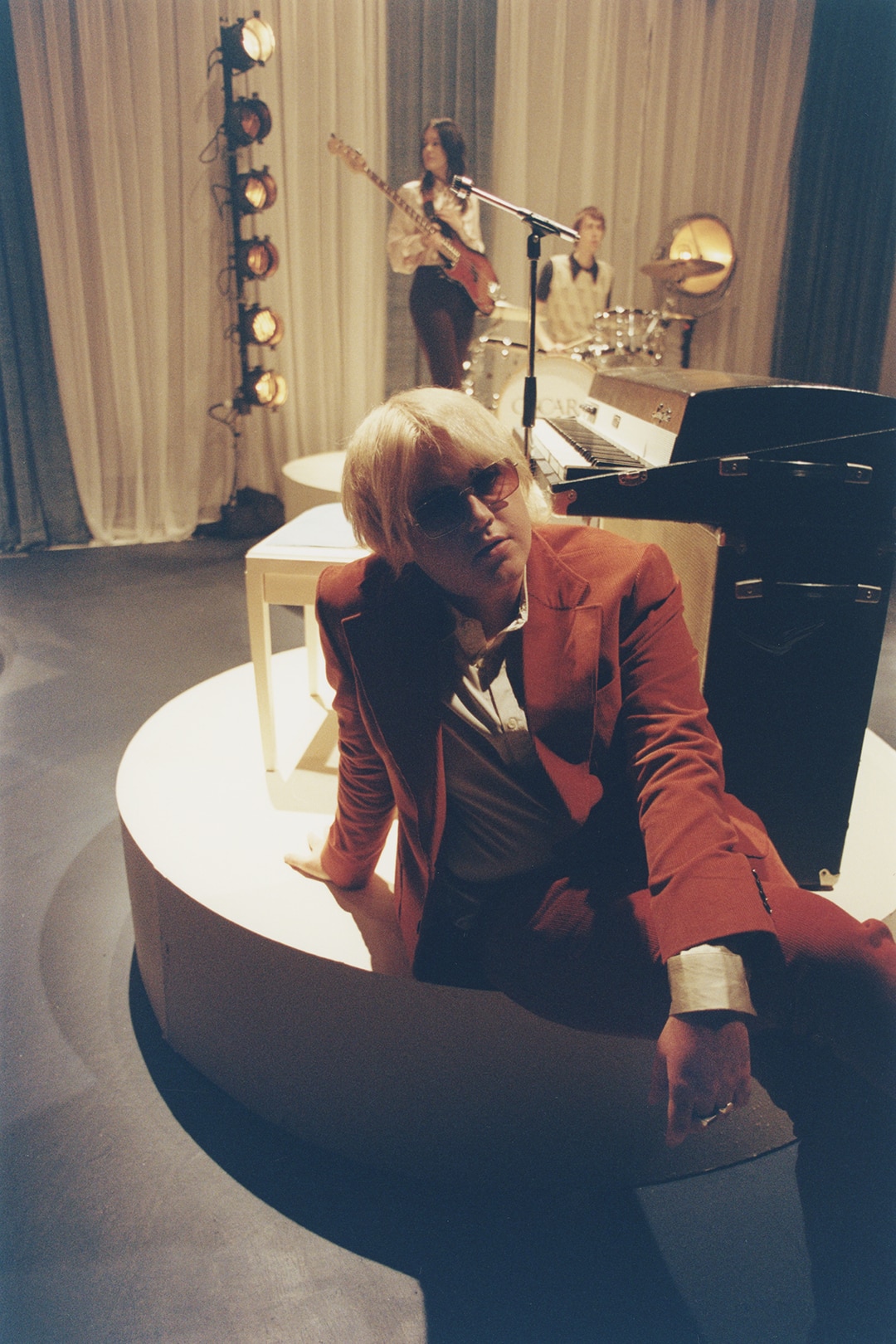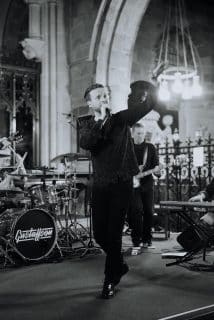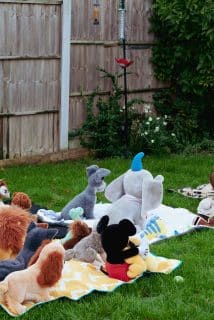Oscar Lang on his stunning new breakup album
Culture
Oscar Lang is the British musician making waves with his new album by stripping it all back to raw emotional truths. He talks to us about getting through the darkest of times with music..
Oscar Lang is the thoughtful singer-songwriter from West London who, for his second album, was intent on doing some groovy indie disco psychedelia – and then he went through a breakup. One of those horrible lonely breakups that wipe you out and veer into true depression. Luckily for him – and for us – Oscar was able to channel his trauma into songs, and began writing an album on his first love, the piano, notably going home to play on the keyboard his late mum bought him as a child. The result is Look Now, an album that’s emotionally raw, beautifully constructed and topped with soaring vocals that send shivers down your spine. We spoke to Oscar about the making of the album, how he deals with anxiety and introversion, and why funky shades are an essential item.
How are you feeling about the album coming out?
Good. It’s very surreal that its release week. I’ve been sat on the record for so long that it feels strange that it’s gonna be out in the world. These things always seem to take forever, it’s so long after you’ve actually written the songs. The whole process of writing this record probably started almost two years ago now. It’s the longest I’ve ever taken on a record other than a record I made when I was 18 called Silk that was made over a period of months and turned from a single into an EP into an album. So that took a while, but this is the first time that I made a decision to take ages on an album.
It’s a very emotional record, can you tell us a little bit about your experiences going into it?
I’ve always had a forward plan of my music and where things are gonna go. And in my head, this next album, the one this one’s coming out now, was going to sound almost disco. We started with this weird half-Daft Punk, half-disco thing. Actually a track I made last year called, Never Been To LA was one of the songs we did around that time. Then I went through a breakup and it changed everything. Going into the studio when you’re feeling miserable, you don’t really want to get on it. You just wanna write, sit at the piano and and sulk, <laughs>. And that’s kind of how it started.
So you had your whole career mapped out in record form and then life had other ideas?
Yeah, and the funny thing is, is that after this record, I had planned to make a piano record. It turned out that this record was that record. This song I was saving for a while called Take Me Apart – I suddenly realised this is the album that I was saving it for.

How was the actual writing when you first started going in this direction?
The first track we did post breakup was a track Cruel, which was a really emotional ballad. After that I wrote A Song About Me, and once those two had gotten in, it was like, ‘oh, I see what this is now’. And it shaped up. I did a lot more piano on this record than I’ve done for a while. It’s my main instrument and I returned to it.
There’s a lot of vulnerability on, on the record, some really heavy stuff. Was it a cathartic thing?
For me, music has kind of been the only form of therapy that I have. I don’t go to therapy. I probably should. But this is the one thing that really works for me. That last year when I made this record was a really low year, ’cause it was the first breakup, it was a collapse of a childhood love. I was suddenly on my own. I was an adult living in my own place, completely on my own. Didn’t have my family around me. It was just some really low moments. And in those low moments I gravitate towards making music because it’s almost the one thing that distracts me. I know that I can sit down and make music and I’m not thinking about anything else. And then suddenly I blink and five hours have passed and it’s 3 am. I’ll go, oh, that’s great, you know, I got through one night and when you’re feeling like that, just to get through one night feels like a big mountain to climb. So it really helped.
Were you dealing with your emotions then shaping them into sort of songs later? How does it work for you?
There were definitely themes and concepts that I wanted to talk about before. On God is a track about my mum. I wanted to speak about my mum for years and had written songs about it before. But none of them really came out the way I wanted them to. I didn’t want them to feel too soppy, I wanted to make a song that felt like everyone could relate to it. You know, anybody that’s lost someone. When it finally came, I dunno, it just hit me one day. I was talking with my friends about how I was raised Roman Catholic and I don’t believe it in it anymore, but how great it would be if He did exist, you know, because that’d be great! Everyone goes to heaven and everyone’s chilling up there and all your family and your dead pets and all your loved ones are all waiting for you. It’s a great concept. And then it clicked in my head that this is the way to talk about it.
How was it when you started sharing it with other people, was it quite nerve wracking?
Yeah, it’s always really nerve wracking to share it. I mean, it’s, it’s a shared process and all the music was made with my co-producer and co-writer for lot of the album Rich Turvey. So it doesn’t feel like a completely insular thing that I then go out and show people because we are working on it together. But when I play it to my mates it’s always a bit nerve-racking, but it’s good.
Were you writing a lot on the piano that your mum bought for you as well?
Yeah. One of the parts about that breakup was that I was on my own in my flat and decided to go home and spend some time at home with the family. It helped, to get away. And it was a weird reconnection to this piano that I’ve had sat at home that my mum bought me when I was a kid. I wasn’t necessarily writing on anything on it, but I was playing the songs that I’d just written and was excited about them. It was just nice to be home and I was just playing a lot of piano on that keyboard. And now it’s like my main instrument but it took me that to sort of realise that, oh, this is the thing I really care about – because I actually know what’s going on with the piano. <laughs> Most of the time with guitar, I only know the shapes and then move them about.
When you’re experiencing quite extremes of emotion is there a sense of needing to capture this in some way?
Yeah. I mean, I feel very lucky that out of feeling low, you can create a track. Some people would just feel low and that’s it. And I have days like that, where I wouldn’t do anything, but there’s just no greater feeling than channeling horrible energy into a song. And then you can listen to it and go, oh, that’s fucking great. And then suddenly you feel a little bit better, you know?
Can you tell us about some of the highlights from the album? Some of the tracks that you, you’re looking forward to people sort of checking out?
I’m really excited for people to check out Circle Line because it’s not out yet. When I studied music in secondary school, music GCSE, I weirdly learned about Steve Reich and fell in love with a piece called Electric Counterpoint, where it’s all these different polyrhythms. And that’s what I wanted to do in Circle Line. So I’m quite excited for people to hear those mad orchestral polyrhythms all going on at once. I know the musos will love it <laughs>.
How are you looking after yourself these days? Are you in a good place now?
Yeah, I think I’m in a much better place now than I was a year ago, that it was really tough. I learned that everything comes in waves. The thing with the breakup was that for a while it felt like I couldn’t breathe. And every now and then you’d come up for a couple of seconds of air. And then suddenly those seconds get longer and, then maybe you spend three days when you feel lighter and then next time it’s five days. It’s a slow process. Time really is the key factor, everything gets better in time.
I really had to just sit and be patient. Which was really, really hard to do. I’m in a much better place now, but I still accept that, I’m gonna go in those lows. One thing I always try to remember whenever I’m having those days where you’re just abnormally happy and you’re walking along the street and, it’s just a really good day. I try and remember on those good days that somebody else is having their worst day. And so when I’m on my worst day, I remember that I can have those good days, you know? Somebody out there right now is having their good day and in time that will be me. But it’s a constant fluctuation.
But that ability to put those kind of experiences into songs, that’s such a valuable thing for people because there’s so many of us out here who can’t really do that. There’s a real nice connection there, isn’t there?
I think that’s the most amazing thing about my music that I’ve sort of discovered over the years. Because I write these songs as a form of therapy, the ones that are my most popular songs are actually ones that really mean something to me. My biggest song She Likes Another Boy, at the time meant so much to me – as every teenager would, I went to a party and watched a girl I like, kiss another guy and it felt like the end of the world. And to see other teenagers now hearing this song and getting thousands and thousands of comments of people going, oh, he doesn’t like me back, or, this is how I feel. I like her and she will never know who I am. All these comments of people that have related to this song, I just find it amazing that this one singular experience everyone can relate to. And I really tried to translate that into the latest album and every song meant something to me. I think that’s gonna translate across to people.
How’s the reaction been for the new tracks?
Good, really good. Most of the comments are lovely. I think the thing that I struggled with for a little bit was Instagram. I despise that app. I found a lot of people would comment on my appearance, which I’ve now gotten a lot better at handling. But t’s really rough when you wake up in the morning and you’ve got them. There was one point where I would wake up to sort of five comments of people just being like, ‘oh, this fucking ugly guy’s making music’, you know what I mean? It was really tough, but I’ve gone a lot better at dealing with that. I think in my head I’m just sort of confused at who are these people? I dunno why you would think something like that. It’s just a weird thing. Horrible. So I try to be off social media as much as possible. I think my label aren’t too happy about that <laughs> but it’s for my mental health really.
When did you first discover that you could sing?
I never discovered it. Really. I was awful at singing for a long time. <laughs> There was never a moment where I went, oh, I can sing. I think maybe that’s happened in the last few years as my voice has really blossomed. And I’m singing more and I’m in the environments where it’s easier to sing. Before I was doing it in my room and now I’m in studios and rehearsal rooms and I can belt more. I can really hit some high notes if I go for it. But when I started, I was godawful, I sounded like a dying cat <laughs>.
What do you hope that people will get from the album?
I hope that it’s almost cathartic for some people. I hope the musos are pleased with their polyrhythms <laughs>. And I hope that people can relate to the things I’m saying, I think tracks like On God. I’ve had a few friends I’ve sent that track to be like I’ve just lost a mate and this meant a lot to me. I really felt this And tracks like, Leave Me Alone for all the other people like me who don’t love going to parties and often will find themselves really uncomfortable and socially awkward. I don’t love that stuff. I have a small group of friends that I like to see, and I’m not a big extrovert, so this album’s a little bit for the introverts. People who like to sit a home with headphones on, you know?
How does it work with, as a performer? If you’re quite introverted socially, on stage do you click into a different part of yourself?
A hundred percent. I mean, I found it easier that way. Back in the day when I first started this project, I was called Pig and it was almost a completely different alias. And then when I had to give up that name for like, legal issues, it was, it was quite strange because then all of a sudden all this music that I almost had a persona for was under my name. So I struggled with that for a few years. I think there still is a definite mode I go into. It’s kind of when I put the sunglasses on. I love sunglasses and I always have. I love Elton John. That’s why I love Funky Shades. And there’s something about when I put those on, then it kind of makes me feel like I’m playing some sort of character. And it makes it easier to do the big shows. But typically, I think the Oscar Lang personality that’s out in the world is completely different to how I am myself. I’m a bit shy.
Look Now by Oscar Lang is out now. Follow Oscar on Instagram:
Trending

Join The Book of Man
Sign up to our daily newsletters to join the frontline of the revolution in masculinity.

















